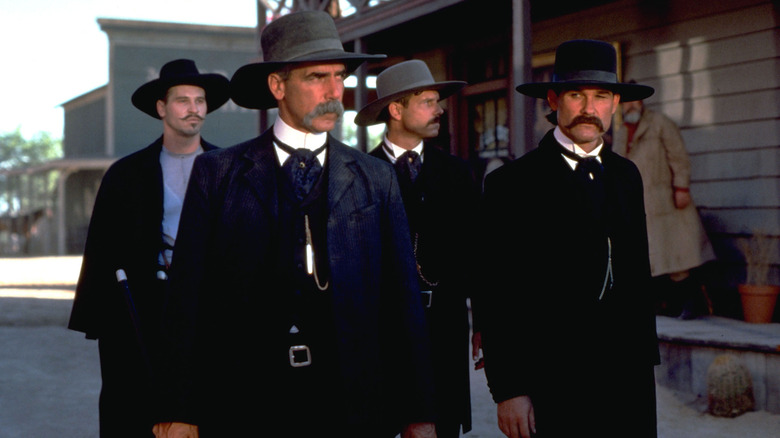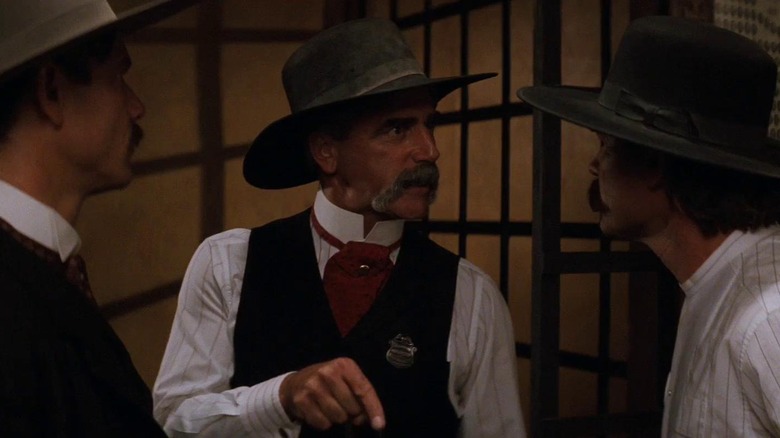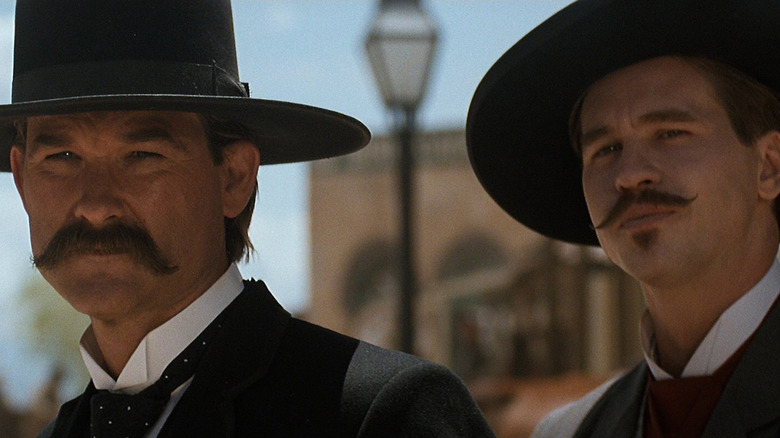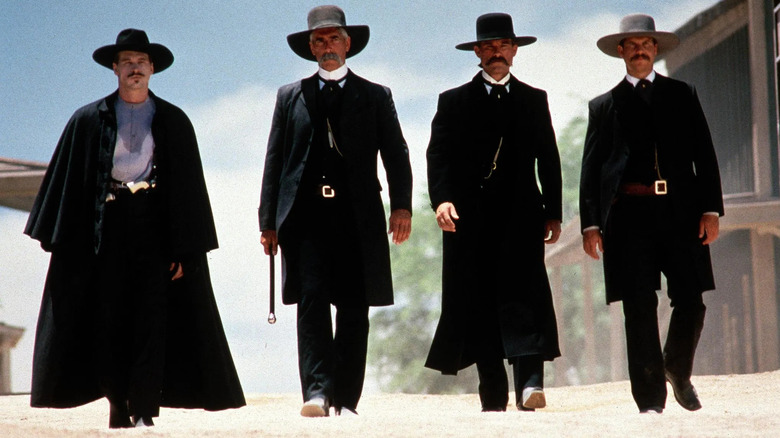Sam Elliot Wasn't Exactly Satisfied With The Final Script For Tombstone
When "Tombstone" trotted into theaters just before Christmas day in 1993, families all over the country flocking to see the action Western were probably completely unaware of just how much of a struggle it was to get the film made. The original screenwriter Kevin Jarre ("Glory") had a highly quotable script that he had every attention of directing himself. After Jarre's own screenplay for "Dracula" was nixed by Universal in reaction to Francis Ford Coppola's intention to direct his own version, there was a risk that "Tombstone" would suffer the same fate after Kevin Costner announced that he and Warner Bros. were moving forward with the sprawling epic "Wyatt Earp."
"Tombstone" had the advantage and about six months of lead time, but Costner was sucking up all the oxygen by securing top-tier actors Dennis Quaid and Gene Hackman. Fortunately, Kurt Russell got hold of Jarre's script and quickly signed on to play a more mythic version of Wyatt Earp. With Russell on board, one of the best ensembles ever for a Western came together quickly, creating a hard-to-miss package featuring Val Kilmer (in a now legendary performance), Bill Paxton, Micheal Biehn, Powers Boothe, and the towering Sam Elliott.
With a greenlit budget of $25 million, Jarre got his wish to direct for the very first time, a decision that proved disastrous when the production fell behind schedule and Jarre was replaced by George Cosmatos (father to "Mandy" director Panos Cosmatos) who had only three days notice before stepping behind the camera. The original script that convinced the other actors, and specifically Sam Elliott, to sign onto the picture started to be trimmed down to focus more on the relationship between Wyatt and Doc Holliday. Elliott's character, Virgil Earp, was sidelined to a certain extent — a change that didn't sit well with Elliott.
'One of the best I've ever read'
As originally reported in Entertainment Weekly, the changes sidelined Elliott's character, Virgil Earp, to the point where the actor said he would've passed on the project if he had known what the final shooting script would wind up looking like. "Initially, the screenplay was one of the best I've ever read," Elliott told EW on the heels of the release of "Tombstone." "If I was given the screenplay as it is now, I'd have to pass on it. They took 29 pages out of it, eliminated the connective tissue, took the character development out." Apparently, Elliott and some of the other actors surreptitiously reinserted some of their favorite bits of dialogue.
For such a histrionic Western filled to the brim with quotable lines, it's no wonder that Elliott wanted to have more moments to shine. In shaving off what could have amounted to almost 30 minutes of screen time from Jarre's original script, the bond between the Earp brothers took a backseat to the bromance developing between Wyatt and his sickly, but fiercely loyal friend, Doc Holliday. Kilmer's firecracker performance was surely a big reason for the switch.
On set, Russell became the leader of the pack onscreen and off, with Kilmer remembering how his contributions to "Tombstone" could have even warranted a producer credit. "Kurt is a very straight-ahead kind of guy with amazing energy," Kilmer said. "He's very good about structure and a character's function. He'll discuss and anticipate things. We had so many powerful actors, it could easily have become a feeding frenzy of sharks going for their own."
With Russell's involvement and Cosmatos coming on board to shake things up, "Tombstone" took on an entirely different life.
Ghost directing
George Cosmatos had previously worked with a fairly domineering Sylvester Stallone on "Rambo: First Blood Part II" and "Cobra," and now with Russell and producer James Jacks reworking the script, the director made changes of his own that led to extensive reshoots that transformed "Tombstone" into a much more action-driven affair. Russell not only gave a wrathful performance as Wyatt Earp, but he also helped extensively behind the scenes. While Russell never went so far as to say he ghost-directed the film, Kilmer has backed up his colleague in the past, saying just how much of the film's success is due to Russell's contributions.
In a post on his personal blog reported on by The Hollywood Reporter, Kilmer spoke about the struggle to get "Tombstone" finished:
"I have such admiration for Kurt as he basically sacrificed lots of energy that would have gone into his role, to save the film. Everyone cared, don't get me wrong, but Kurt put his money where his mouth was, and not a lot of stars extend themselves for the cast and crew. Not like he did."
When production finally wrapped on August 29 after 88 days of shooting according to EW, "Tombstone" was a couple million dollars over budget and had to rush editing to meet Disney's Christmas Day release deadline. Exhausted but elated, the film's six-time Oscar-nominated cinematographer William Fraker said, "If I wasn't happy with what was on the screen, it would be entirely different. But I think we have a movie."
That comment was made after Fraker quit three times after butting heads with George Cosmatos, by the way.
The ghosts of the OK Corral
Of course, the real Doc Holliday never uttered the endlessly entertaining quips that Kilmer delivers in "Tombstone," and the actual events at the O.K. Corral (short for Old Kindersley Corral) only lasted for a few moments on the morning of October 26, 1881. The previous night, Holliday and the outlaw rancher Ike Clanton got into blows at the Alhambra saloon, leaving Clanton to drink the night away while making dangerous threats against Holliday and the Earps.
After a no-guns ordinance was enacted earlier in the month prohibiting the use of firearms within Tombstone's city limits, Clanton and other cowboys were angry about the new policy, including Clanton's brother Billy and members of the McLaury gang. The Clantons and McLaurys were reportedly armed and refused to surrender their weapons when the Earps found them in a lot near the O.K. Corral. No one knows who shot first. Ike managed to escape, leaving his brother and Tom and Frank McLuary dead on the street. 1993's "Tombstone" ends with a little more fanfare and gunfire, sending Russell's Wyatt Earp on a revenge tour across the Arizona plains.
Even if it's not entirely accurate, "Tombstone" is a holiday hit that brought a sense of adventure back to the Western. Following in the footsteps of Lawrence Kasdan's raucous shoot-'em-up "Silverado," the non-stop one-liners, high melodrama, and magnificent mustachery of "Tombstone" turned a volatile production into an undeniable crowd-pleaser. The rest is film history, it's just not real history.



